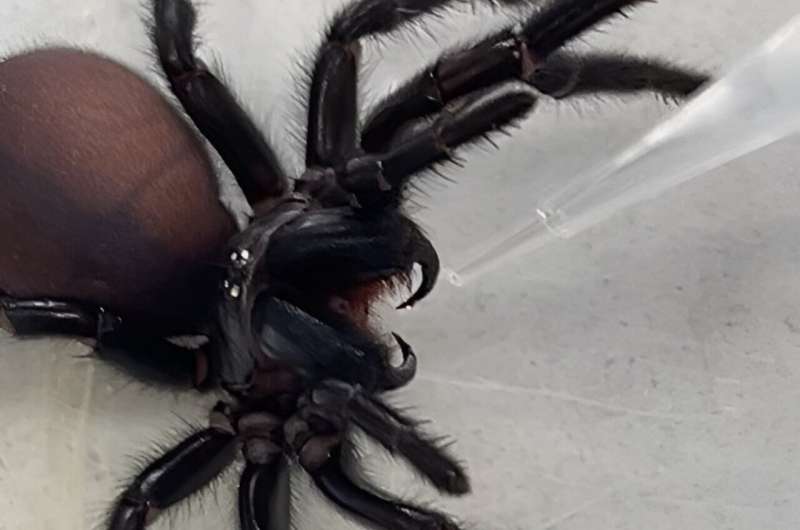This article has been reviewed according to Science X's editorial process and policies. Editors have highlighted the following attributes while ensuring the content's credibility:
fact-checked
peer-reviewed publication
trusted source
proofread
Spider venom-based heart drug is a step closer

A spider venom molecule being investigated by a University of Queensland team has met critical benchmarks towards becoming a treatment for heart attack and stroke.
Associate Professor Nathan Palpant and Professor Glenn King from UQ's Institute for Molecular Bioscience have previously shown that the drug candidate Hi1a protects cells from the damage caused by heart attack and stroke. Dr. Palpant says that a subsequent study has put the drug through a series of preclinical tests designed to mimic real-life treatment scenarios.
The study was published in the European Heart Journal.
"These tests are a major step towards helping us understand how Hi1a would work as a therapeutic—at what stage of a heart attack it could be used and what the doses should be," Dr. Palpant said. "We established that Hi1a is as effective at protecting the heart as the only cardioprotective drug to reach Phase 3 clinical trials, a drug that was ultimately shelved due to side effects. Importantly, we found that Hi1a only interacts with cells in the injured zone of the heart during an attack and doesn't bind to healthy regions of the heart—reducing the chance of side effects."
Professor King, who recently won the Prime Minister's Prize for Innovation for developing the world's first insecticides from spider venom, discovered Hi1a in the venom of the K'gari funnel web spider.
"Hi1a could reduce damage to the heart and brain during heart attacks and strokes by preventing cell death caused by lack of oxygen," Professor King said. "Our testing and safety studies from independent contract research organizations [have] provided evidence that Hi1a could be an effective and safe therapeutic."
UQ researcher Associate Professor Mark Smythe noted that cardiovascular disease is the leading cause of death globally.
"Most deaths from cardiovascular disease are caused by heart attacks and strokes, yet there are no drugs on the market that prevent the damage they cause," Dr. Smythe said. "An effective drug to treat heart attack would have worldwide impact, providing a breakthrough to improve the lives of millions of individuals living with heart disease."
The research team included Dr. Meredith Redd from IMB as well as Dr. Melissa Reichelt and Dr. Yusuke Yoshikawa from UQ's School of Biomedical Sciences.
More information: Meredith A Redd et al, Acid-sensing ion channel 1a blockade reduces myocardial injury in rodent models of myocardial infarction, European Heart Journal (2023). DOI: 10.1093/eurheartj/ehad793




















